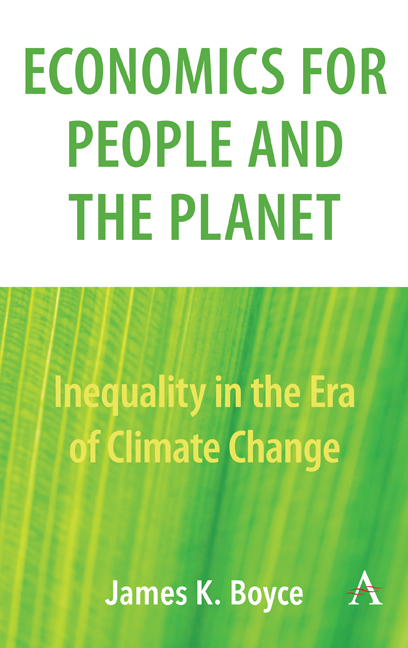Book contents
- Frontmatter
- Contents
- List of Illustrations
- Acknowledgements
- Part I Rethinking Economics and the Environment
- Chapter 1 Limits to Growth–of What?
- Chapter 2 The Twin Tragedies of Open Access
- Chapter 3 Pursuing Profits–or Power?
- Chapter 4 Rent in a Warming World
- Chapter 5 Universal Assets for Universal Income
- Chapter 6 Universal Basic Income: Six Questions
- Chapter 7 Environmentalism's Original Sin
- Chapter 8 Rethinking Extinction
- Part II Environmental Injustice
- Part III Climate Policy
- Notes
- Publication History
- Index
Chapter 7 - Environmentalism's Original Sin
from Part I - Rethinking Economics and the Environment
Published online by Cambridge University Press: 12 February 2019
- Frontmatter
- Contents
- List of Illustrations
- Acknowledgements
- Part I Rethinking Economics and the Environment
- Chapter 1 Limits to Growth–of What?
- Chapter 2 The Twin Tragedies of Open Access
- Chapter 3 Pursuing Profits–or Power?
- Chapter 4 Rent in a Warming World
- Chapter 5 Universal Assets for Universal Income
- Chapter 6 Universal Basic Income: Six Questions
- Chapter 7 Environmentalism's Original Sin
- Chapter 8 Rethinking Extinction
- Part II Environmental Injustice
- Part III Climate Policy
- Notes
- Publication History
- Index
Summary
Humans-versus-nature is a dead end.
In 2007 the National Audubon Society, one of the leading environmental organizations in the United States, issued a report headlined ‘Common Birds in Decline’. Based on statistical analysis of 40 years of bird population data, it announced the alarming decline of many of our most common and beloved birds.
The story attracted wide press coverage. ‘Spreading suburbs and largescale farming are contributing to a precipitous decline in once common meadow birds,’ began a story in the New York Times. An accompanying editorial lamented, ‘We somehow trusted that all the innocent little birds were here to stay. What they actually need to survive, it turns out, is a landscape that is less intensely human.’ A letter to the editor predicted that the deadly pattern will continue ‘as long as we ask the earth to support too many people’.
Few commentators bothered to study the study itself. Had they done so, they would have found some more upbeat news, as well. They might have noted, for example, that among 309 bird species for which statistically meaningful trends could be established from the data in two population surveys, birds showing a ‘large increase’ in numbers exceeded those showing a ‘large decrease’. Forty-one species recorded a large increase in both of the surveys; only twelve saw a large decrease.
Looking at the data on individual species, reported in an appendix to the study, readers would have found that one species registering a large increase was the bald eagle, until recently classified as endangered in the lower 48 states. The eagle's numbers rebounded after the 1972 ban on use of the pesticide DDT. Another rapidly increasing species is the wild turkey, extirpated in many north-eastern states more than a century ago by forest clearing for agriculture. It has returned as abandonment of farms led to forest regrowth. In both cases, the comebacks were actively abetted by private and governmental restoration initiatives.
Of the species that registered significant declines, many are birds of open habitats–meadows, pastures and early successional forests–habitats that were created and sustained by farmers in the eighteenth and nineteenth centuries on lands that have now reverted to forest.
- Type
- Chapter
- Information
- Economics for People and the PlanetInequality in the Era of Climate Change, pp. 23 - 26Publisher: Anthem PressPrint publication year: 2019



